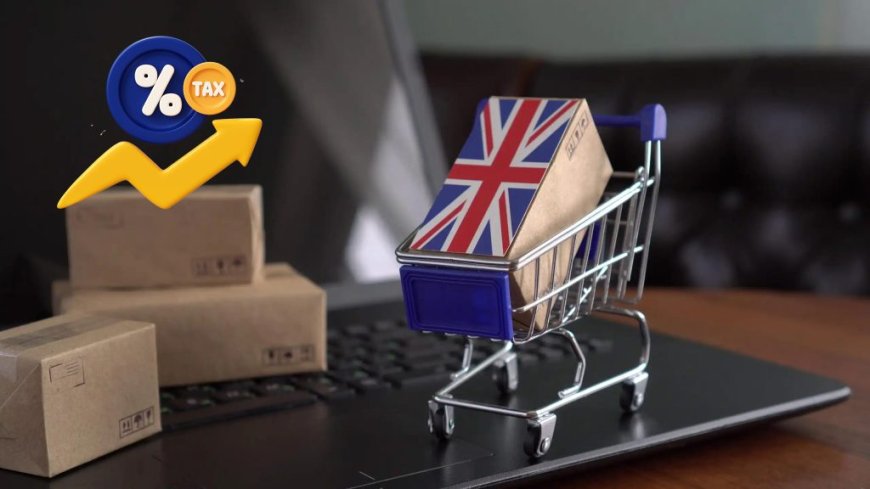Cross-Border Selling: US LLC & Tax Essentials for UK Companies
Learn how UK sellers can expand into the US using a US LLC while staying compliant with tax rules, sales tax obligations, and UK–US reporting requirements. Discover the complete cross-border guide to structuring, filing, and scaling successfully.

A Story of Big Dreams and Hidden Risks
Tom was pacing around his small London office late one evening. He had built a growing e-commerce brand in the UK selling premium tech accessories on Shopify. His products were stylish, well-made, and loved by his British customers.
Then it happened.
A major US influencer showcased one of his phone cases, and within 24 hours, Toms website exploded with orders from across the Atlantic. He was thrilled. But somewhere beneath the excitement sat an uncomfortable knot in his stomach.
He kept hearing advice about forming a US LLC to handle American sales. It sounded promising but also risky. What would this mean for taxes? Was he unlocking new revenue, or walking into a maze of cross-border rules, double taxation traps, and paperwork he didn't understand?
Thats what brought him to Lanop Business and Tax Advisors. He didnt want superficial advice. He wanted clarity. He needed a US LLC and tax guide that explained selling to the USA from the UK, how US sales tax works, what HMRC expects, and how to scale safelywithout drowning in compliance.
Heres the guide Tom received,and now its yours too.
Why British Sellers Form a US LLC
For many UK entrepreneurs, forming a US LLC is the first big step when expanding into the American market. Heres why its such a popular path:
Credibility and Trust
A US entity makes your brand look more legitimate to American customers and platforms. It signals commitment.
Better Banking & Payments
A US LLC lets you open a US bank account,smoother payments, fewer currency headaches, and a more professional setup for US buyers.
Personal Liability Protection
If something goes wrong (like a product liability claim), your personal assets are protected.
Tax Flexibility
You can choose how the LLC is taxed. Depending on your elections, it can be a pass-through entity or taxed like a corporation.
But forming the LLC is only the beginning. The real complexityand opportunityare in how it's taxed and how you stay compliant on both sides of the Atlantic.
How US Taxes Work for UK Sellers
If youre a UK resident running a US LLC and selling into America, certain US rules kick in.
The IRS may classify your income as effectively connected income (ECI) if it considers you to be doing business in the US.
You might trigger this if:
-
You store inventory in a US warehouse (e.g., Amazon FBA).
-
You hire US-based contractors or employees.
-
You perform meaningful business activities within the US.
If this applies, youll likely need to file a US federal tax return.
Depending on your LLCs structure, that might mean Form 1040-NR or Form 1120.
You may also have additional obligations, for example, foreign-owned LLCs often need to file Form 5472, reporting transactions with their non-US owners.
State Sales Tax: Understanding Nexus
This is where most UK sellers slip up.
US sales tax isnt like VAT. Its not national, its state-based, with different rules everywhere. You only become responsible for collecting sales tax once you create nexus in a state.
There are several types:
Physical Nexus
Triggered by having inventory, an office, or employees in a state.
Economic Nexus
Many states have thresholds, for example, $100,000 in sales or 200 transactions.
Marketplace Nexus
Some states require marketplaces like Amazon to collect tax for you. Others dont.
Click-Through Nexus
Using affiliates can sometimes create nexus, depending on their state.
Once you hit nexus, you must:
-
Register for a sales tax permit
-
Charge the correct state/local tax at checkout
-
File and remit returns
Missing these can lead to penalties, back taxes, and expensive audits, a common UKUS cross-border trap.
How to Properly Form a US LLC
If you're a UK seller expanding into America, heres the right way to set up your LLC:
1. Choose the Right State
Delaware, Wyoming, and Nevada are common choices due to cost, privacy, and legal benefits.
2. Get a Registered Agent
Someone based in the LLCs state who receives official documents.
3. Get an EIN
This tax ID lets you open bank accounts, file returns, and operate legally.
4. Set Up a US Address
Needed for IRS correspondence and general business operations.
5. Open a US Bank Account
Essential for clean accounting and smoother payment flows.
A well-structured LLC reduces your risk of double taxation and helps align your US and UK tax obligations.
How HMRC Views Your US LLC
This is where things get interesting.
HMRC often treats US LLCs as tax opaque entities, meaning the LLC is considered a separate company, not a pass-through structure like the IRS might.
This can mean:
-
You may only owe UK tax when you take distributions from your LLC
-
Those distributions may be viewed as foreign dividends, not trading profits
This mismatch between the UK and US tax systems is a major cause of unexpected tax bills if you don't plan ahead.
Avoiding Double Taxation
When operating a US LLC as a UK resident, your goal is simple: dont pay tax twice on the same income.
Here are key strategies:
Use the UKUS Tax Treaty
You may be able to claim foreign tax credits for tax paid in the US.
Choose the Right US Tax Election
Aligning your US tax classification with HMRCs view can make life easier.
Consider Using a Blocker Entity
In some cases, having a US C-Corp owned by your UK company creates a more efficient structure.
The best structure depends on how much profit you keep in the US, how often you repatriate funds, and what your long-term goals look like.
Withholding Forms: W-8BEN and W-8BEN-E
If you sell through platforms like Amazon or Stripe, theyll ask for one of these forms:
-
W-8BEN for individuals
-
W-8BEN-E for businesses
These forms prove you're not a US person and help you claim treaty benefits.
Get them wrong, and platforms may withhold up to 30% of your income.
Get them right, and you avoid unnecessary withholding.
Risks of Getting It Wrong
Heres what UK sellers face if they try to figure it out as they go:
-
Owing years of unpaid state sales tax
-
IRS penalties for missing required forms
-
Platforms withholding large portions of income
-
UK tax issues from incorrectly reported LLC profits
-
Cash flow bottlenecks
-
Being taxed twice on the same income
Cross-border mistakes get expensive very quickly.
What Sellers Are Saying Online
Across online communities, UK sellers share the same concerns:
-
Confusion about whether they need to file US tax returns
-
Difficulty understanding sales tax rules
-
Uncertainty about running a US LLC vs a UK Ltd for a US-focused business
-
Worries about forms like 5472 and W-8BEN-E
-
Nexus and Amazon FBA questions everywhere
The pattern is obvious: the opportunity in the US is huge, but the rules are complex.

Best Practices for UK Entrepreneurs Expanding into the US
Heres a practical roadmap for doing it right:
-
Form your US LLC properly
-
Evaluate which states you have nexus in
-
Choose selling channels that align with your tax strategy
-
Complete your W-8BEN or W-8BEN-E accurately
-
Use accounting tools that handle GBP and USD
-
File US tax returns correctly and on time
-
Report everything properly to HMRC
-
Use foreign tax credits where available
-
Review your structure as you grow
-
Work with cross-border specialists
Conclusion: Turning Ambition into Sustainable Growth
Toms journey from a UK e-commerce seller to a cross-border US operator taught him something crucial: revenue is not the same as profit, and profit comes with rules when you cross borders.
Forming a US LLC was only the first step.
The real workand real opportunity came from understanding US sales tax, navigating cross-border rules, avoiding double taxation, and staying compliant with both HMRC and the IRS.
If you're a UK seller planning to expand into the US, this guide isnt optional; its essential.
At Lanop Business and Tax Advisors, we help UK businesses build the right US structure, stay compliant, minimize tax, and scale confidently.
With the right foundations, you dont just grow revenue, you build a global business with long-term stability.









































